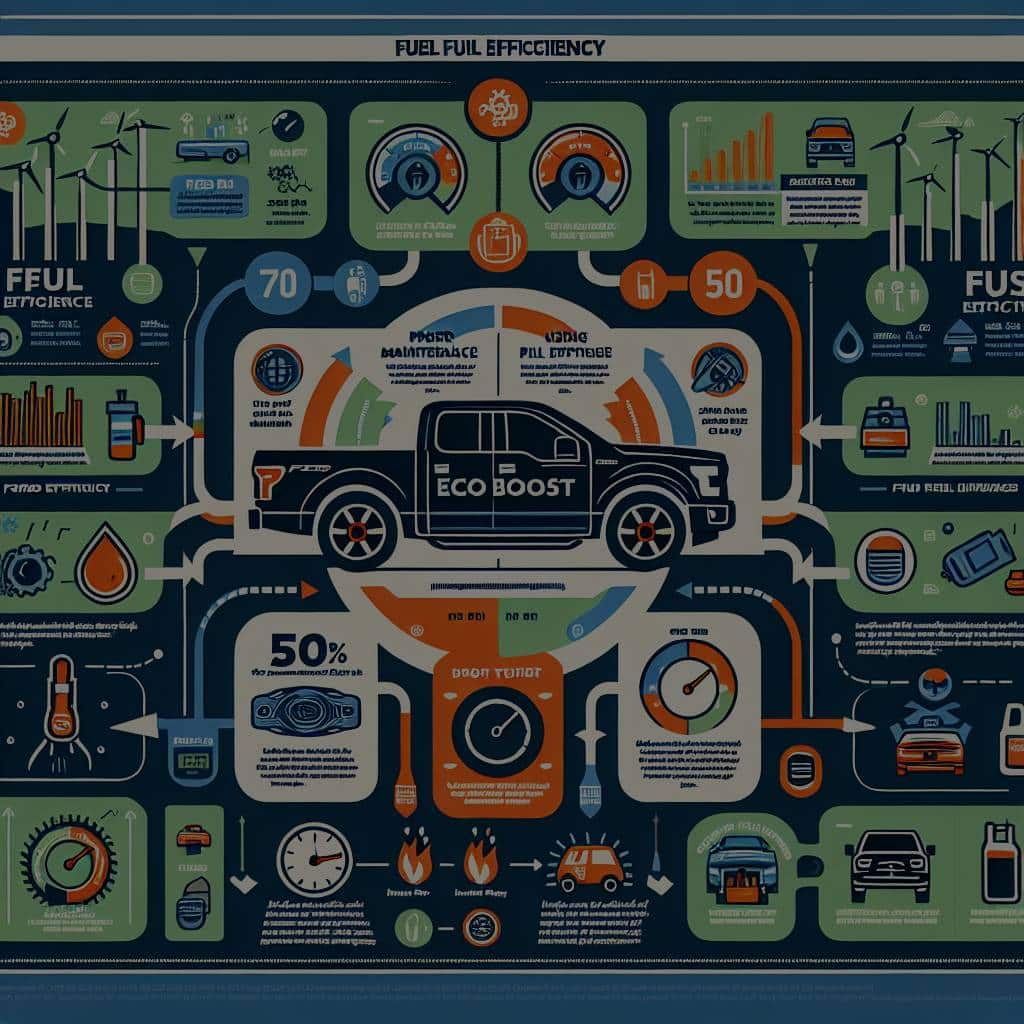How Can You Optimize the Fuel Efficiency of a Ford F-150 EcoBoost?

When it comes to trucks, Ford F-150s are a household name. Known for their robust engines and excellent performance, they’ve garnered a loyal clientele over the years. However, amidst all praises, one thing that can be a potential concern is fuel economy. When you’re driving a beast of a vehicle like a Ford F-150 EcoBoost, it’s natural to crave more miles per gallon (mpg).
In an era of rising fuel prices, the question arises: how can you increase the fuel efficiency of your Ford F-150 EcoBoost without compromising on its power and performance? The good news is, it’s very much possible.
In the same genre : Can an E85 Conversion Kit Boost Power in a Nissan 370Z?
This article will delve into the details, bringing you the best tactics to maximize the fuel economy of your Ford F-150 EcoBoost.
So, buckle up as we embark on this insightful journey.
Also to see : How to Choose the Best Quick Detailer for a Black Car to Minimize Swirl Marks?
Understanding the Features of the Ford F-150 EcoBoost
Before we dive into the tactics of optimizing fuel efficiency, let’s understand the core features of the Ford F-150 EcoBoost. This knowledge will help you deeply understand your vehicle, allowing you to make the most appropriate modifications and adjustments for improved fuel economy.
Ford has designed the F-150 EcoBoost with an advanced engine system and turbocharging technology. This powerful combination optimizes power and torque, delivering an unparalleled driving experience. However, these traits also contribute to the vehicle’s fuel consumption.
The EcoBoost engine, for instance, uses direct injection and turbocharging to provide power equivalent to larger, naturally aspirated engines. This advancement is the cornerstone of the vehicle’s performance, but it can also be a bit of a fuel hog.
Tips to Improve Fuel Efficiency
1. Optimize the Air-Fuel Mixture
The amount of air mixed with fuel in the engine can significantly impact the fuel economy of your vehicle. A lean air-fuel mixture – that is, more air than fuel – burns more efficiently and provides better fuel economy. However, it can also cause the engine to run hot and may lead to damage over time.
On the other hand, a rich mixture – more fuel than air – cools down the engine but it decreases the fuel economy. Therefore, the key is to maintain an optimal air-fuel mixture to improve fuel economy without risking damage to the engine.
2. Watch Your Driving Habits
Your driving habits can profoundly influence the fuel economy of your vehicle. Aggressive driving, rapid acceleration, and high-speed driving can significantly reduce your vehicle’s mpg.
Instead, practice smooth driving. Accelerate gently, maintain a consistent speed, and avoid rapid braking. Also, use cruise control on highways to maintain a constant speed, further improving fuel economy.
3. Regular Maintenance
Regular maintenance is another highly effective way to improve fuel efficiency. Replace air filters regularly, keep tires properly inflated, and ensure that the engine is well-tuned. Regular oil changes are also crucial as dirty oil can cause friction in the engine parts, lowering the vehicle’s overall efficiency.
4. Use the Right Fuel
The type of fuel you use in your Ford F-150 EcoBoost significantly affects its performance. Since this truck is equipped with a high-performance engine, it requires high-octane fuel to operate at its best. Lower quality fuels can cause the engine to underperform, thereby affecting the vehicle’s fuel economy.
Installing Performance Tuners
For some of you, the aforementioned methods might not be enough to get the desired increase in fuel economy. If you’re still unsatisfied with your Ford F-150 EcoBoost’s gas mileage, consider installing a performance tuner.
Performance tuners or chips are devices that modify the electronic control system of your vehicle to improve performance and efficiency. A performance tuner can optimize the air-fuel mixture, increase torque, and improve the overall fuel efficiency of your vehicle.
Moreover, with a tuner, you can customize your vehicle’s performance according to your driving preferences. Whether you want to increase power for towing, or improve fuel economy for long drives, a tuner will allow you to do so.
Remember, though, that while tuners can improve fuel economy, they should be used responsibly. Extreme tuning can stress the engine and result in premature wear. Always consult with a professional before installing a performance tuner in your vehicle.
Tuning your Ford F-150 EcoBoost for improved fuel economy involves careful consideration and understanding of your vehicle’s engine. Whether you choose to alter your driving habits, opt for regular maintenance, use the right fuel, or install a performance tuner, each of these methods can help you achieve higher miles per gallon. While the process may require time and money investment, the benefits in terms of improved fuel economy and vehicle performance are well worth the effort.
Boosting Fuel Efficiency with Cold Air Intake Systems
Another effective method to increase the fuel economy of your Ford F-150 EcoBoost is to consider installing a cold air intake system. Cold air intake systems are designed to deliver more cold air, which is denser, into your engine. This denser air carries more oxygen, which can lead to a more efficient combustion process.
Cold air intake systems replace the vehicle’s standard air box with a short, smooth pipe and a high-flow air filter. This setup reduces air flow resistance and allows more cold air to reach the engine. As a result, the engine can burn fuel more efficiently, increasing performance and ultimately improving fuel economy.
However, when adding a cold air intake system, it’s crucial to keep in mind that while they can help boost your vehicle’s fuel efficiency, they should be installed correctly to avoid causing potential damage to the engine. Always consult with a professional or a reputable customer service representative who can guide you through the process.
The Impact of Custom Tunes on Fuel Efficiency
Apart from hardware modifications, software alterations like custom tuning can also play a significant role in optimizing the fuel efficiency of your Ford F-150 EcoBoost. Custom tunes are software modifications that reprogram the engine control unit (ECU) to enhance performance and efficiency.
Custom tunes can optimize various parameters such as air-fuel ratio, ignition timing, and turbo boost pressure to increase performance and reduce fuel consumption. They can also be tailored to suit different driving conditions and needs.
For instance, if your primary concern is maximizing fuel economy for long drives, a custom tune can be programmed to prioritize fuel efficiency over power. On the other hand, if towing heavy loads is a common task for you, a custom tune can enhance horsepower and torque without significantly sacrificing fuel economy.
However, it’s important to remember that custom tunes should be handled by experienced professionals to avoid damaging the engine, voiding the warranty, or causing illegal emissions.
Remember, custom tunes are not a one-size-fits-all solution. Therefore, consult with professionals to ensure you get the most out of your Ford EcoBoost engine.
Conclusion
Optimizing the fuel efficiency of a Ford F-150 EcoBoost doesn’t necessarily mean sacrificing power or performance. With a better understanding of your vehicle’s engine and the right techniques such as maintaining an optimal air-fuel mixture, regulating driving habits, performing regular maintenance, using high-quality fuel, installing a performance tuner, and considering a cold air intake system or custom tunes, you can significantly enhance your vehicle’s fuel economy.
Remember, while these methods can improve your gas mileage, they require careful consideration, professional guidance, and sometimes an investment. However, the benefits of improved fuel economy and increased performance make it well worth the effort and cost.
In the end, optimizing fuel efficiency is not just about saving money at the pump. It’s also about understanding and caring for your vehicle, improving its performance, and reducing its environmental impact. So, take the journey of optimization for your Ford F-150 EcoBoost, and enjoy the ride even more as you see the results in increased miles per gallon and enhanced performance.
